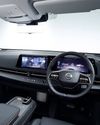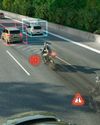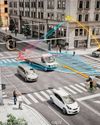試す 金 - 無料
Will Hydrogen-Powered Vehicles Become Part Of Future Mobility?
Auto Tech Review
|May 2019
The automotive industry has been witnessing development of several alternate fuels for the energy source of vehicles, but there is one source that has been waiting to become the next big technology. We are talking about hydrogen as a fuel as well as hydrogen fuel cells as an energy source for vehicle propulsion.

The most widely talked about hydrogen vehicle propulsion technology is hydrogen fuel cell vehicles (FCV). Toyota Motor Corporation, Honda Motor Company, and Hyundai Motor Company have been the leading OEMs developing hydrogen fuel technologies. However, over the past few years, a number of other companies have also focussed on developing hydrogen-based propulsion systems and technologies through a large number of collaborations.
The hydrogen fuel revolution received a major push in 2015 when Toyota decided to offer free access to its intellectual properties around hydrogen fuel cell technologies. While this initiative put the company at the forefront of all hydrogen-related development work, it provided the automotive industry with a wealth of knowledge on this technology and enabled other stakeholders to assist in its further development.
HYDROGEN PROPULSION SYSTEMS
Hydrogen can be burned in an internal combustion engine to convert its chemical energy into mechanical energy. However, the largely-adopted form of hydrogen as a fuel is in the case of FCVs. Therefore, it is appropriate to say that hydrogen vehicles are essentially electric vehicles since they are powered by an electric motor to drive the wheels. Fuel cell vehicles combine hydrogen and oxygen to produce mechanical energy, which is subsequently used to power an electric motor. However, the driving range and refueling processes of such vehicles are more comparable to conventional internal combustion engine vehicles.
このストーリーは、Auto Tech Review の May 2019 版からのものです。
Magzter GOLD を購読すると、厳選された何千ものプレミアム記事や、10,000 以上の雑誌や新聞にアクセスできます。
すでに購読者ですか? サインイン
Auto Tech Review からのその他のストーリー

Auto Tech Review
Sound Generation For Enhanced Road Safety
With an ever-increasing number of fully electric and hybrid vehicles entering the market, we are witnessing a change in the acoustic experience in and around the car. The silent nature of the electric powertrain means that other road users miss the familiar acoustic cues that warn them of an approaching vehicle. To remedy this situation, Harman is working on various noise management solutions.
6 mins
August 2020

Auto Tech Review
OBJECTIVE ASSESSMENT OF THE SAFETY CONTRIBUTION OF TODAY'S AUTOMOTIVE HEADLAMPS
Good lighting makes a major contribution to road safety. In 2011, the International Commission on Illumination (CIE) presented an evaluation system for headlamps that can objectively assess the quality of illumination and glare limitation. New light sources like LEDs and lighting functions (glare-free high beam, partial high beam) have been available for several years, so that an extension of the proven CIE method is necessary, which takes into account, among other things, changed switch-on and service lives of new lighting functions and represents a generally understandable evaluation system. An evaluation system presented in the following by the Technische Uni versität Darmstadt, which was developed by an encompassing expert commission, is intended to provide representative data and enable an objective evaluation of headlamp performance.
8 mins
August 2020

Auto Tech Review
RAPIDO RE-INNOVATES TO CATER TO POST COVID-19 LAST MILE CONNECTIVITY
The rapid pace of urbanisation in the country has witnessed cities expanding and subsuming surrounding villages and smaller towns, evolving into Tier II and III cities.
5 mins
August 2020

Auto Tech Review
FUNCTIONAL SAFETY STANDARDS TOP PRIORITY FOR FUTURE AUTOMOTIVE DEPLOYMENT
Increasing levels of electronic content in vehicles result in a large amount of software that is required to run the scenes behind the mechanical aspects of a vehicle. Electronic systems in automobiles are part of every section, from the powertrain to comfort and convenience systems as well as all types of safety equipment. This makes electronics and the software running these systems a critical part of the equation for future mobility solutions. In addition, putting standards in place to measure methods of developing, testing and functioning of such electronic systems also becomes highly relevant.
5 mins
August 2020

Auto Tech Review
“BYD'S EV STRATEGY TO ENCOMPASS MOST FORMS OF TRANSPORTATION NEEDS IN INDIA”
The country’s electric vehicle (EV) ecosystem is grappling with a plethora of challenges even as it is striving to wriggle itself out of the ‘nascent stage’ tag. In an exclusive chat with Auto Tech Review, Zhang Jie Ketsu, Executive Director, BYD India shares his perspective on the current EV scenario and how the company intends to progress faster in the Indian automotive industry
7 mins
August 2020

Auto Tech Review
SAFETY IN ELECTRIC AND AUTONOMOUS CARS – SIMULATION OF COMPLEX CRASH SCENARIOS
Electric and autonomous vehicles allow for novel seating arrangements and packaging strategies, presenting new safety challenges. Physical crash testing must be supplemented with virtual simulation to ensure vehicle safety on shorter development cycles. With its Simcenter Madymo MBS software, Siemens provides improved runtimes and the Active Human model, enabling accurate and rapid occupant safety analysis in complex crash scenarios.
6 mins
August 2020

Auto Tech Review
KIA SONET – A MIGHTY OFFERING IN THE COMPACT SUV SEGMENT
It wouldn't be wrong to say that Kia Motors India has taken the Indian market by storm in less than 12 months of its presence in the market.
4 mins
August 2020

Auto Tech Review
NISSAN'S NEW DIRECTION: ARIYA ALL-ELECTRIC
Marking a key milestone in Nissan’s transformation strategy, Ariya ticks a lot of boxes highlighting the strengths of the global automotive giant.
5 mins
August 2020

Auto Tech Review
BETTER SAFETY WITH EMERGENCY BRAKE ASSIST FOR MOTORCYCLES
Rear-end collisions with a slower vehicle suddenly cutting into the lane and intersection accidents with cross-traffic are among the most frequent motorcycle accident types. Continental is now developing an emergency brake assist, which detects an imminent collision with a vehicle ahead or with an obstacle, warns the rider and supports him during braking
7 mins
August 2020

Auto Tech Review
ADAS WILL SERVE AS CATALYST FOR IMPROVED VEHICLE SAFETY
The automotive industry across the globe is increasingly focussing on safety.
5 mins
August 2020
Translate
Change font size
